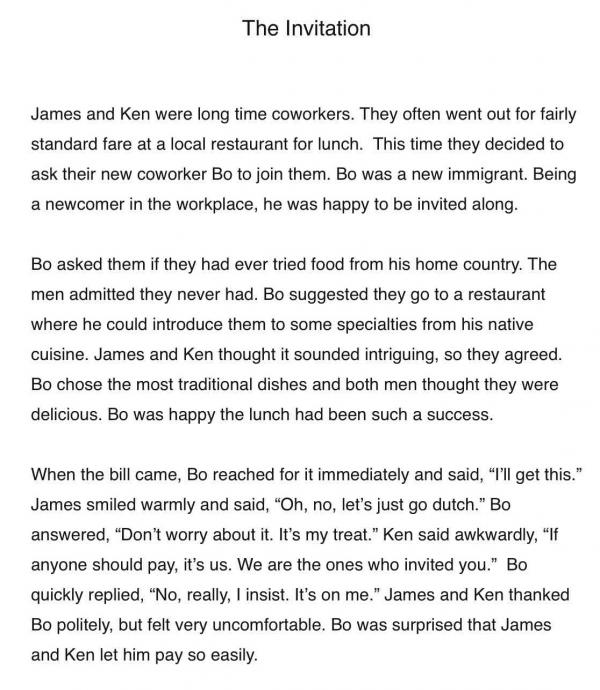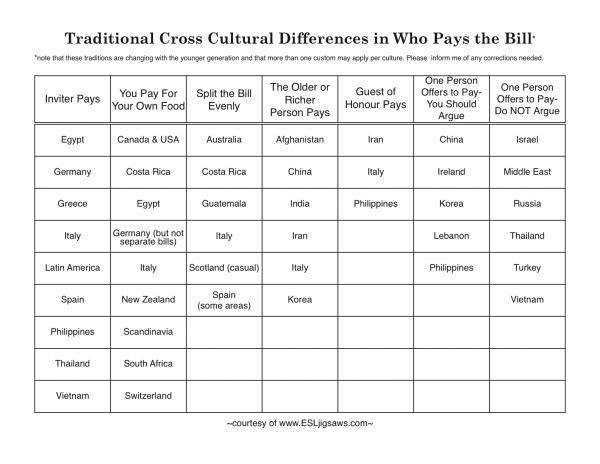ESL Jigsaws
5 Minutes Prep - 2 Hour Interactive Lesson!
Soft Skill: Who Picks Up the Bill?
We often think of bargaining language as confined to situations like a garage sale or to the purchase of larger items like cars or homes. One of the most common negotiations most people will engage in at some point is who will pay the bill in a restaurant. Not only are there language and soft skills specific to this situation, many cultural assumptions are thrown into the mix. Countries, as well as the cultures within them, differ in their norms about who should pick up the tab and when. Learning the related idioms and other bargaining language but not cracking this cultural code and developing the soft skills to successfully navigate this interaction can lead to social awkwardness as exemplified in the story below.
Adapted from Callan’s Contemporary Jigsaws 2, I have changed the story from a jigsaw to a simple intermediate reading. Read what happens below when Bo tries to pay for lunch.

To get your own copy of this story with the questions that follow, for use in your own classroom, click here.
Bo had different cultural norms around paying the bill. In some countries, such as Australia or Guatemala, it is customary for diners to split the bill evenly. In others, such as Switzerland or Canada, diners pay only for what they have eaten. In perhaps most countries of the world, one person offers to pay. I've created a chart to list some of these differences below. (Please let me know if there is anything I have missed or gotten wrong.) Click on the chart to view it large on your computer and download it if you want.
Finding out it is the norm for one person to pay is not where it ends, though. It's unfortunately more complicated than that! Even in cultures where it is customary for diners to go dutch, one person might still offer to pay. How should you respond? In some cultures, such as in Vietnam or Iran, when your companion offers to pay, you should not argue and simply accept politely. In others, such as in China or Korea, you should argue and insist you will pay.
How many times should you offer to pay? In North America, just as with offering second helpings of food, it's customary to offer once, follow up with an "Are you sure?" and then drop it. In other cultures, this might leave a bad impression, as if you made no real effort to pay. If you followed this North American custom with Chinese hosts, they might wonder why you didn't try to shove the money in their pocket or say you were going to the washroom and discretely pay the server.
So, how can you acquire the soft skills to successfully navigate these cultural differences without causing offense? Do you have to memorize the chart above? How do you think the scenario with Bo would have played out if James and Ken had simply shared that when they go out for lunch with coworkers, they always "go dutch" and asked Bo about his customs? What might have happened if Bo, as the newcomer, had said something like, "I'm happy to pay if we are taking turns. What's customary for you two?"
Perhaps the best soft skill to acquire is the habit of sharing openly about your traditions and politely offering others the opportunity to share about theirs.
For teachers of beginner levels who wish they could find something on this topic for their own level, consider taking a look at Callan's Contemporary Jigsaws 1. The same story exists at a lower level in jigsaw format. For teachers of intermediate levels, the same story exists in a shorter jigsaw format in Callan's Contemporary Jigsaws 2. Both books have a listening cloze that accompanies the story.
Post your comment
Comments
No one has commented on this page yet.
RSS feed for comments on this page | RSS feed for all comments



